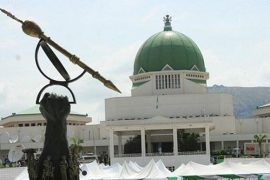Nigeria: Calls for Local government autonomy and unending question of interest

By Ifeanyi Mandela
Nigeria operates a federal system of government which simply means the sharing of power between the central government and the federating or components units which in Nigeria’s case, the federating units are known as states. However, the 1976 constitutional reform and that of 1999 amendment had given recognition to the Local Government Authorities (LGAs) as the third tier of government.
The call for local government full autonomy has heightened in the recent times for more efficient level of government by basically amending constitutional provisions that states and their local governments should operate a joint financial account. The Joint State, Local Government Account means that the state receives both its funds and that of its local governments from the federal allocation, and thereafter disburses funds from this Joint State, Local Government Account to its different local governments.
Granting local government full autonomy would entail basically two elements which include an independent/direct funding from the federal government, and a local government electoral body.
There have been arguments for and against granting LGAs full autonomy. Those on one side argue that granting full autonomy would make their chairmen uncountable to the state’s governor thereby creating political frictions and rivalry. They further argue that if LGAs were granted full autonomy that there’d be nothing left for the state government since states are made up of LGAs, hence depleting state’s importance. The Nigeria Governors Forum (NGF) as far back as 2014 raised concerns against this amendment. They alleged that “ The push for local government autonomy by the National Assembly was hasty without first considering the problems of executive recklessness and ineffective administration at the local level.”
But those on the other side attribute inefficiency and corruption in the local government to the states. They argue that since most state governors hand-pick who becomes the local government chairmen that they {chairmen} end up dancing the tunes of their masters which results to corruption and inefficiency.
LOCAL government reforms in Nigeria
Since 1976, several efforts have been made by successive governments to actualise local government autonomy. Such efforts include the 1976 reform, which made local governments the third tier of administration, the 1979, 1989 and 1999 reforms and constitutional amendments. All these reforms and amendments gave constitutional recognition to local authorities as the third tier of government and categorically spelt out its areas of jurisdiction.
HOW is LGA not independent?
A lecturer in the department of Public Administration, Ahmadu Bello University of Zaria, Idris Ahmed Jamo pointed out that “the country’s constitution usually specifies the powers of each level of government so that there would be harmony and mutual cooperation in the administration of the system, such that no level of government would be jeopardised.”
This is a far cry from reality as there are pointers that the federal government bottle-feeds the whole states, while the states in turn do same to their various local governments.
The framers of the constitution infused the Joint State, Local Government Account clause which has rendered the local government structure dependent on the state governments; hence destroying virtually any atom of autonomy of LGAs.
The bone of contention is captured in the explanations of Idris Ahmed Jamo. Three bills sponsored from the previous administration sought to amend Section 7, sub- section 162, of the 1999 Constitution, which borders on political and financial independence for local government administration in the country. The bills also sought to amend Section 7, subsection 313 and Section 162 of the 1999 Constitution so as to ensure an effective operation of the local government system for social, economic and political development. The bills basically aimed at correcting the ambiguity in certain sections of the constitution, as well as establish a four-year tenure for local government chairmen.
Whose gain?
Curiously, there have been strong oppositions from majorly the governors under the aegis of Nigeria Governors Forum (NGF). There are governors who only appoint caretaker administrators in lieu of allowing the state electoral body to conduct elections for LGAs while some of them neither appoint or allow elections in their states.
Reacting to issues on local government autonomy, President Muhammadu Buhari said, “Apparently, it is corruption that led to the relegation of local governments to the grip of state governments over the years, thereby distorting and demeaning the real status of our federalism, with regards to devolving governance. A once vibrant tier of government, which occasioned development at the grassroots, has gone into oblivion, due to obvious reasons.
The soldiers of LGA autonomy
Both the upper and lower chambers of the National Assembly have passed the autonomy bill. However, the constitution requires the minimum 24 out of the 36 states to endorse before it could become a law. Currently, only 10 states have considered the bill, and as at February, report has it that only nine out of the 11 are in support of the ‘Local Government Allocation Account’ bill which seeks to abrogate the status quo.
It is on record that most state houses of assembly have rejected their own autonomy. This development once more puts the state houses of assembly to the ridicule of being rubber stamps for governors.
Interestingly, President Muhammadu Buhari in his affirmation to the bill said
“I and my team are waiting patiently to receive reports from state Houses of Assembly so as to do the needful in the event that the current proposal for the review of the 1999 Constitution (as amended) comes to us for consideration and assent.”
As the clamour for LGA autonomy rages, the leadership of Nigeria Labour Congress (NLC), Nigerian Union of Teachers (NUT), Association of Local Government Association (ALGON)and Medical and Health Workers’ Union of Nigeria (MHWUN) recently declared full support for the call for local government autonomy being championed by NULGE
LGA autonomy, whose gain?
Could there be unseen hands seeking full autonomy for the local government for selfish gains, or is it a genuine interest for the masses as those involved claim?
Some school of thought believe the autonomy would create local lords who’d wrestle local government(s) from the state or maintain a chunk of state’s power by having some LGAs as bargaining power during elections. This, they believe have made governors paranoid of the outcome of this autonomy. Corroborating this fear, the NGF pointed out that “the amendment will lead to the hijack of some local government administrative structures by a few powerful individuals without the oversight the state government currently provides.”
Could there be unseen hands seeking full autonomy for the local government for selfish gains, or is it a genuine interest for the masses as those involved claim?
However, proponents believe that local government autonomy is part of the general restructuring Nigerians have been clamouring for. A political scientist, Igboanugo Celestine believes that the benefit of full autonomy outweighs its demerits. In his words: We need LGA autonomy as much as we need restructuring at the federal/state level. If government at local level is given autonomy, at initial stage, it might be hijacked, but like every human endeavour, the law of dialectics will take place and we will eventually have something close to ideal which will become the real situation.”
On the fears that some local politicians could hijack the autonomy of the local government when actualised, Igboanugo asserted that “After the struggle for power, over the years, the various local lords will have to reach a compromise, and if the masses are an enlightened one, their voice will also be easily heard since they can easily associate themselves with those in local government like councillors and the appointed supervisors.”
In the same vein, a political observer and social critic, Mr.Ugwu Joseph Ebuka noted that the outcome of the autonomy lies with the leaders. He says, “It all boils down to leadership. An autonomous community with the right leadership has little or nothing to worry about”.
The chairman of NULGE, Mr. Ibrahim pointedly accused NGF of hijacking the LGA for selfish interest “…But the governors have hijacked this tier of government for their own advantage. This is why we are doggedly following this issue and we are not happy with most of the governors that are foot dragging on this issue. If you look at the governors from the north western states, they are foot dragging,” Khaleel said.
Mr. Khaleel said that the union was not asking legislators to automatically endorse the bill, but to conduct public hearing as agreed by the Speakers Forum and the Governors Forum.
The National Assembly noted that local council chairmen and councillors are at the mercy of the state governors and therefore have rendered the local councils powerless and ineffective
Worthy to note is that there are two out of the 36 states governors have openly thrown their weight in support of LGAs autonomy. These are governor Ibikunle Amosun of Ogun state and Ifeanyi Okowa of delta state. Amosun said the governors that are against the idea are trying to justify their practice of illegally deducting money from the councils’ monthly allocation. On his part, Okowa said any leader who desires the good of his people and the development of the grassroots must support local government autonomy.
And the line seems to be drawn between the NGF on one side and the NASS, NULGE and other civil society organisations


